Welcome back to the Faculty Features series! Every Friday during this eight-week series we’ve shared a short interview with some of our faculty members; highlighting their teaching, upcoming courses, and getting to know them better! Today, in the final installment of the series we’re featuring Professors Allen Anderson, Andrea Bohlman, Erin Cooper, Dan Davis, and Tim Hudson.
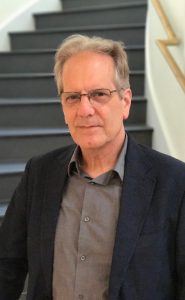
Professor Allen Anderson
What is your position on faculty and what courses are you teaching next semester (and this summer, if applicable)? I’m a Professor in my 25th year at UNC. Most of the time I teach classes related to music composition and music theory, though I have recently taught the large Foundations of Music class, MUSC 120, as well. I teach Advanced Composition, MUSC 266, fairly regularly with a different semester project each term. Last fall, the composition students wrote music for animation shorts produced by students in North Carolina State University School of Design. This semester the composers are writing string orchestra works to be read by the UNCSO. I don’t know yet what the composition theme will be in the fall, but I look forward to the prospect of once again meeting with students in person. I will probably teach one or two music theory courses next year. I’ve taught all levels of the theory sequence and I am currently teaching Counterpoint, MUSC 332, for the first time since 2014.
What is your favorite part of teaching? It is always gratifying and validating when students take control of their musical skills and expression. For example, it is usually evident when a student composer becomes alert to the possibilities and consequences of their musical choices. Part of my role is to ask the questions that lead the student to that self-awareness.
What is the project that you’re most excited about currently? In my own creative work, I have several compositions in progress with a piano piece getting the most attention at the moment. In conjunction with the counterpoint class I’m teaching, I’ve spent some time recently writing a set of variations on the Wallace Willis spiritual Steal Away to Jesus.
What are some of your non-musical hobbies? I have several musical hobbies that at times spill over into “work”: playing electric guitar and fooling around with synthesizer gizmos. There’s something about all that amplification that appeals to me. Since the pandemic, I have made a point of taking regular walks around Chapel Hill. I set out with the sole purpose of seeing/finding something I didn’t know was there. I’ve been amazed by what I hadn’t seen in the previous 25 years: most “No outlet” streets have an exit for the walker.
If your students could learn one thing from you, what do you hope it will be? That there’s almost always time to write another variation.
What music are you currently listening to? In order to get in shape for teaching counterpoint and to resuscitate my admittedly limited-at-best piano skills, I have been playing a lot of Bach keyboard music (all of the WTC, Partitas and Suites, as well as some organ music). With the composition students writing string orchestra pieces this semester, I have been concurrently listening to/studying works with that instrumentation. I particularly recommend Jessie Montgomery’s Starburst and Pierre Boulez‘s Livre pour cordes.
Anything else you’d like students to know about you or your teaching? I love the subjects I teach. I want to share what excites me in the hope of hearing back what excites my students.
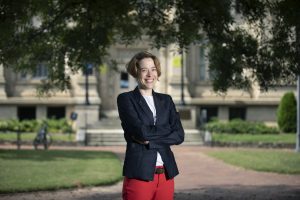
Associate Professor Andrea Bohlman
What is your position on faculty and what courses are you teaching next semester (and this summer, if applicable)? I am an associate professor in the music department’s academic division. I’m just wrapping up—today in fact!—a class called “Sound and Gender” that is a larger lecture class (MUSC 286). The class is built around asking questions: of ourselves and of each other. The class is organized around a series of larger themes, like disability, protest, performance, and voice. Within those, we use different topics to ask questions about how sound and gender have been related to each other (historically, cross culturally) and how we experience both as individuals. We’ve learned about drag, protests for reproductive rights, expert vocal techniques from a range of musical genres, and misogyny in music technology, just to name a few.
As a researcher, I work across a number of fields: the cultural and social histories of music, social movement studies, and sound studies. This semester, I am leading a graduate seminar that surveys recent publications in sound studies called “Sound and/as Rupture.” We’re interested in talking about how scholars navigate the ways people experience sound and music as overlapping—but often distinguishable—categories. One of the interesting learning tasks we gave ourselves was to read a book a week. This has meant the seminar feels quick and intense: once you put down one book, it’s time to pick up another. But a key skill in the humanities is to learn how to read books strategically: zoom in on a passage that’s hard to understand, an argument you’re excited to read. And make sure to zoom out for the big picture: Why did the author write this book? For whom? That helps us think together about what we want our own books to look like.
What is your favorite part of teaching? Conversation. I relish when students speak from their own expertise and work hard to foster moments to share in the classroom. I think a special function of the classroom is that we have common points of reference—and often very different points of view. Especially about music, listening, and other creative modes of being, which we often understand to be essences of ourselves. Classroom environments facilitate a respectful and open-minded exchange about these differences.
What is the project that you’re most excited about currently? Next year I have a sabbatical to work on a book project about the history of tape recording–in particular recording projects that try to capture the feeling of being in a place and being away from one’s home community. Now we record lots of things on our phones and other electronic devices: friends singing along to songs in the car, animals charmingly chomping on nuts in the park, a story for instagram with our own musings about existential crises, and then some. My book is a kind of prehistory of that practice. It asks the question: what work do we want these recordings to do? What editing decisions do we make? What are the limits and possibilities sound recording technology provides?
What are some of your non-musical hobbies? I like to be on the move: biking, walking, traveling, on occasion driving. Biking and walking in particular keep me in tune with the world around me. Traveling is one of the great creative and intellectual inspirations for me. Usually I like to spend months at a time away from home.
If your students could learn one thing from you, what do you hope it will be? I do not have an answer to this question! Or, let me dodge it this way: I hope my students make plans to keep learning and exploring—in whatever way they like—after we share a class together.
What music are you currently listening to? Right now for work: Roscoe Mitchell’s 1966 album Sound. Right now for pleasure: the Raincoats’ 1983 The Kitchen Tapes.
Anything else you’d like students to know about you or your teaching? I’m always happy to be a resource for enthusiastic conversation or meandering ennui.
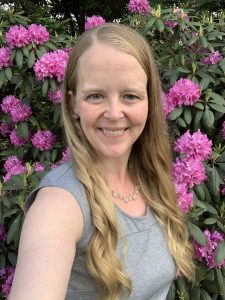
Assistant Director of University Bands Erin Cooper
What is your position on faculty and what courses are you teaching next semester (and this summer, if applicable)? I serve as the Assistant Director of University Bands, so I assist with the instruction of the Marching Tar Heels as well as our pep bands. In this role, I conduct the pep band at the Women’s Basketball games. I also direct the Symphony Band year-round which is open to students of all majors, and we typically perform two concerts each semester. In the spring semester, I instruct a music education course called Instrumental Methods where future teachers learn how to play woodwind and brass instruments.
What is your favorite part of teaching? Creating lifelong memories with students whether it be an amazing musical moment in a concert or their favorite halftime show or a basketball tournament trip – I love that our music students are able to have experiences that they will remember for a lifetime and someday tell their grandchildren. I also particularly enjoy that at UNC I teach mainly non-music majors in our ensembles. They are so musically talented yet are also high achieving in other fields – most often the sciences. It gives me great joy to know that they are continuing their musical endeavors at the college level and will hopefully do so throughout their entire lives.
What is the project that you’re most excited about currently? It is exciting to start planning for a new concert season and a new marching season. Programming repertoire is one of my favorite aspects of my job, and I have missed having that opportunity this year. However, I have continued my running list of ideas, so it is exciting to think these plans may be able to come to fruition!
What are some of your non-musical hobbies? Cooking is one of the most relaxing activities for me! I love trying to make yummy but healthy food – and being creative in the kitchen is a nice distraction from my normally busy schedule. I also have been practicing Pilates and yoga for about eight years, but during the pandemic, I started doing rebounder or trampoline HIIT workouts which has not only made me more fit but has really helped with my mental health and anxiety. It has been a fun new challenge, but all of the workouts incorporate great music playlists – so it’s not too non-musical!
If your students could learn one thing from you, what do you hope it will be? Resilience. As students transition into the real world, it is natural to experience failure and rejection – and for some, it will be for the first time. While it is inevitable for everyone, I hope they can turn to their love of music to get them through those tough times and know that the next success is on the horizon.
What music are you currently listening to? Mostly whatever my partner is playing on one of his guitars! We are hoping to do some recording projects together this summer, so I’ll often hear him playing Bill Frisell and Julian Lage arrangements – and we will be working on some flute and guitar transcriptions – it should be a lot of fun!
Anything else you’d like students to know about you or your teaching? During the pandemic, I have been learning how to play the accordion! It has been so much fun learning something new and remembering what it feels like to be a beginner – which is very humbling! As we all prepare for some much-needed rest and relaxation this summer, I hope our students spend time doing that which brings them joy – whether it be an old favorite or a new endeavor – musical or non-musical!
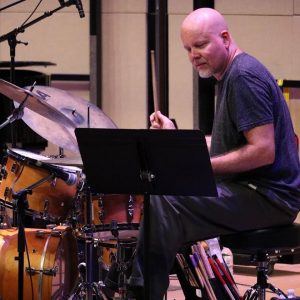
Lecturer Dan Davis
What is your position on faculty and what courses are you teaching next semester (and this summer, if applicable)? I am Dan Davis and I teach jazz drum set and coach combos here at UNC.
What is your favorite part of teaching? I have been on faculty at Carolina for 10 years and in that time, I have enjoyed watching our students mature as people and musicians.
Our jazz department conducted this year’s Carolina Jazz Festival completely online. This also included streaming concerts by our student combos and jazz faculty. It was a wonderful experience to be a part of this and very rewarding to watch the students participate in online workshops and lessons. We as a faculty are excited about the 2021 UNC Summer Jazz Workshop in June. I always look forward to performing, leading a combo, and teaching jazz history every year.
What is the project that you’re most excited about currently? It is a rewarding experience to teach at UNC. I enjoy passing on information about jazz performance and jazz history to future generations. Currently, I am involved in a multitude of teaching and recording projects in a variety of musical styles. We are all looking forward to the day when we can get back to performing regularly in the community.
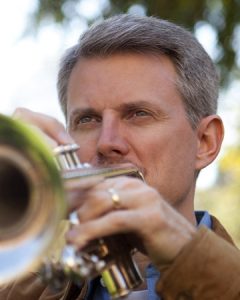
Lecturer Tim Hudson
What is your position on faculty and what courses are you teaching next semester (and this summer, if applicable)? Lecturer: Trumpet Instructor, Studio Class, Trumpet Ensemble
What is your favorite part of teaching? My favorite part of teaching is helping the students develop their skills on their instrument and watching them grow as musicians.
What is the project that you’re most excited about currently? I have a list of things I’m excited about! This includes putting together a nationally competitive trumpet ensemble for UNC and preparing them to be selected to compete at the National Trumpet Competition, and recording another CD with the Carolina Brass, celebrating our 25th anniversary, which is this coming year.
What are some of your non-musical hobbies? Spending time with my kids. I enjoy playing ball with my youngest son, Luke, and lifting weights with my older son, Tom. Michelle and I both enjoy gardening and the outdoors in general.
If your students could learn one thing from you, what do you hope it will be? How to be successful.
What music are you currently listening to? I listen to many styles. Last night I listened to a CD with Ellis Marsalis playing jazz piano. Today I listened to the Haydn Trumpet Concerto, and Tower of Power.
Anything else you’d like students to know about you or your teaching? Be positive. Keep the vision of where you’re going, take it one step at a time, and don’t give up!
